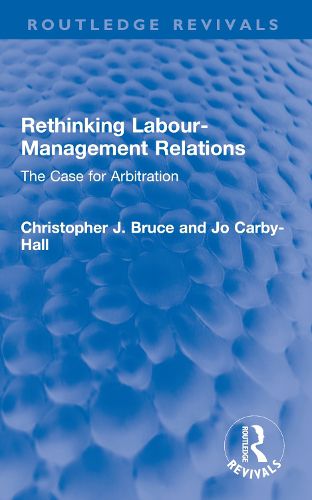Readings Newsletter
Become a Readings Member to make your shopping experience even easier.
Sign in or sign up for free!
You’re not far away from qualifying for FREE standard shipping within Australia
You’ve qualified for FREE standard shipping within Australia
The cart is loading…






First published in 1991, Rethinking Labour-Management Relations explores how the contemporary system of industrial relations developed and outlines proposals for a better alternative.
The book examines the positives and negatives of three systems of industrial relations: a freely operating market for labour where workers bargain individually with employers; a strike-based system of collective bargaining; and, a compulsory arbitration system. It discusses how the strike replaced individual bargaining, highlighting the deficiencies in these respective systems and presenting arbitration as the more efficient and effective way of settling disputes. In doing so, the book emphasises the role of the parties involved in finding solutions and considers how government intervention could be kept to a minimum.
Exploring a wealth of literature relating to compulsory arbitration systems around the world and formulating a set of criteria for establishing the best possible form of arbitration, Rethinking Labour-Management Relations will appeal to those with an interest in the history of trade union theory, public policy, and labour law.
$9.00 standard shipping within Australia
FREE standard shipping within Australia for orders over $100.00
Express & International shipping calculated at checkout
First published in 1991, Rethinking Labour-Management Relations explores how the contemporary system of industrial relations developed and outlines proposals for a better alternative.
The book examines the positives and negatives of three systems of industrial relations: a freely operating market for labour where workers bargain individually with employers; a strike-based system of collective bargaining; and, a compulsory arbitration system. It discusses how the strike replaced individual bargaining, highlighting the deficiencies in these respective systems and presenting arbitration as the more efficient and effective way of settling disputes. In doing so, the book emphasises the role of the parties involved in finding solutions and considers how government intervention could be kept to a minimum.
Exploring a wealth of literature relating to compulsory arbitration systems around the world and formulating a set of criteria for establishing the best possible form of arbitration, Rethinking Labour-Management Relations will appeal to those with an interest in the history of trade union theory, public policy, and labour law.